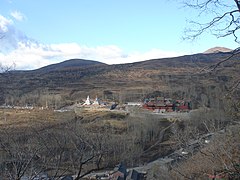Taihang Mountain
Background
The Taihang Mountains were formed during the Jurassic. Brown forest and Cinnamon soils are found here.
The name of Shanxi Province, meaning "west of the mountains", derives from its location west of the Taihang Mountains. The name of Shandong Province (east of the mountains) originally applied to the area east of the Xiao Mountains, but by the Tang dynasty it refers to the area east of the Taihang Mountains; this entity evolved into the modern-day Shandong Province, though the actual border of the province has moved considerably to the east.
The Hai River system runs through the Taihang Mountains. The Red Flag Canal is located on the south edge of the Taihang Mountains.
The Shijiazhuang–Taiyuan high-speed railway crosses under the Taihang Mountains via the Taihang Tunnel, which, at almost 28 kilometres (17 mi), is the third longest railway tunnel in China.
Many references to this range in “Fanshen” by William Hinton, with their significance in the Chinese Socialist revolution.
Gallery
-
Taihang in Hebei
-
Taihang in Changping, Beijing
-
Scenery of Taihang Mountain
-
Mount Cangyan
-
Mount Qibugou
See also
- The Foolish Old Man Removes the Mountains (Chinese: 愚公移山), One of the two mountains mentioned in the ancient Chinese myth, the other is Mount Wangwu.
- Taihangshan Gorge of China
- Guoliang Tunnel
References
- ^ Shanxi | province, China. Retrieved April 1, 2021.
{{cite encyclopedia}}:|website=ignored (help) - ^ Taihang Mountains | mountains, China. Retrieved April 1, 2021.
{{cite encyclopedia}}:|website=ignored (help) - ^ "山西省情概况". China Taiwan Network (in Chinese). April 6, 2011. Retrieved January 31, 2018.
- ^ "山东历史" (in Chinese). sdchina.com. September 27, 2009. Retrieved January 31, 2018.
External links
- "A Walk in the Taihang Mountains". Shanghai Star. March 10, 2005. Archived from the original on March 22, 2005. Retrieved January 30, 2014.









